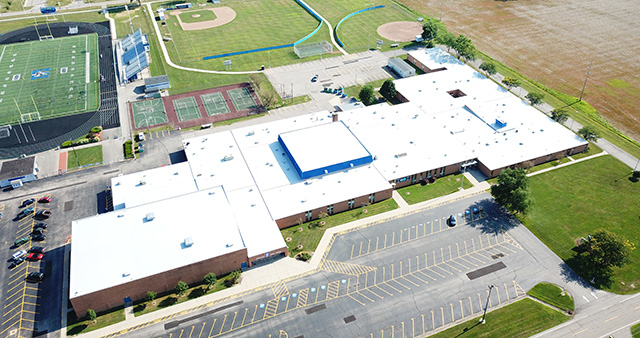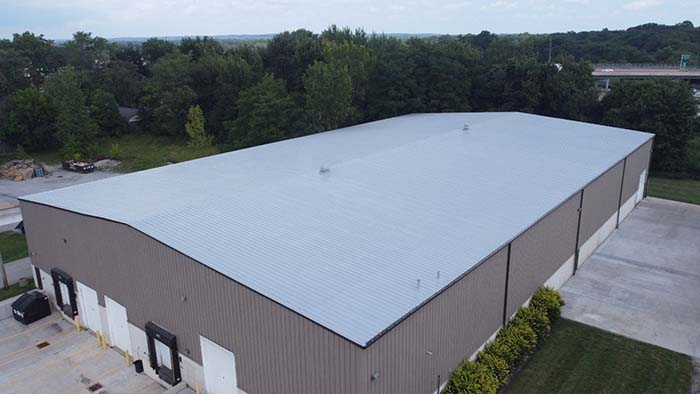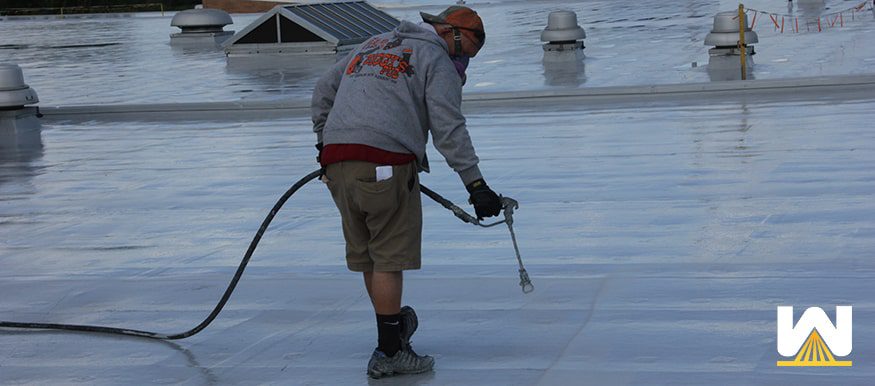Summary: Minimizes tear-off, grants a new 10-20 year warranty, reduces roof temp which saves on energy bills and HVAC usage, and minimizes business interruption.
Maybe you manufacture boxes…or perhaps you make fishing rods and reels.
Whatever you “make,” you must ensure your commercial roof works as well as possible.
If you have any of these issues:
- The roof is in good order, but the warranty is about to expire
- There’s some minor leaking, and I want the roof fixed as cost-effective as possible
- Our building’s energy bills are ridiculous, and we’d like to reduce those costs
A “cool roof” might be your best option.
In this article, we’ll cover:
- What is a “Cool” roof?
- How do they minimize tear-off?
- What warranties do “cool roofs” come with?
- How do “cool roofs” reduce roof temperature?
- How do they minimize business interruption?
And just so you’re aware, West Roofing Systems has been in commercial roofing since 1979. Silicone roof coating systems have been around since around 2007-2008. We’ve used coatings since 1979 to provide UV protection on spray foam roofing systems. Now silicones are being installed on their own.
Let’s get started!

- What is a “cool” roof?
A cool roof is a roofing system that can be installed over an existing roofing system. They are cost-effective when installed over any commercial roofing system besides anything granular.
It just takes too much coating to smooth the surface smooth, then install the necessary coating to get a warranty. In this case, a spray foam roofing system is much more cost-effective.
Cool roofs can be:
- Acrylic – a water-based coating that’s only applied to roofs with a slope. They are cheaper per gallon but require a much thicker application.
- Silicone – the best bang for the buck regarding price and performance. Works in all climates.
- Urethane – has the best impact resistance but is pricier than silicone.
- How do they minimize tear-off?
The best benefit that a cool roof provides is minimizing tear-off. Only the areas with wet insulation or damaged membrane are removed and replaced.
Labor hours are minimized when reducing tear-off. The cost of new material is minimized. Landfill fees are minimized.
If 75% – 99% of your roof is still good, why remove it?
After the roof is prepared, a cool roof is spray-applied or rolled onto an existing roof.
- What warranties do “cool roofs” come with?
The warranty for cool roofs depends on the thickness of the coating. A thicker application = a longer warranty.
For example, on silicone roof coating systems:
- A 20-mil total thickness grants a 10-year warranty
- A 25-mil total thickness grants a 15-year warranty
- A 30-mil total thickness grants a 20-year warranty
- How do “cool roofs” reduce roof temperature?
On some projects, simply installing a lighter-colored coating over a darker roof will reduce the temperature.
On commercial roofs that already have a lighter color, making them seamless can provide significant benefits, such as:
- All the seams on the roof are covered. Seams are where most leaks begin.
- All the penetrations are seamless. Penetrations include drains, HVAC units, pipes, skylights, etc. These areas are prone to leaking.
- A seamless application prevents heat/cool air from escaping. This reduces energy expenses and wear and tear on your HVAC units.

- How do they minimize business interruption?
Installing a coating system over an existing roof (versus tear-off) minimizes business interruption.
For example, on a 100,000 sq. ft. roof that’s to be coated, it would only take 8 pallets of drums of coating to do that job vs. potentially 100,000 sq. ft. worth of iso board, coverboard, rolls of membrane, boxes of screws, etc.
Coating systems minimize the space in a parking lot or around a building, which could displace employees’ parking spots, further interrupting their day-to-day business operations.
Conclusion
Hopefully, you learned the benefits of a cool roofing system. Here are some other articles you might find interesting:
- How much do silicone roof coating systems cost per square foot?
- What problems do coating systems have?
- What are the eligibility requirements to get a roof coating system?


